James Maliszewski's Blog, page 8
August 15, 2025
Interview: James Edward Raggi IV (Part II)
Part I of this interview can be found here.
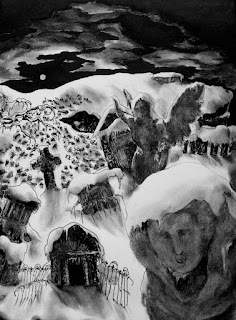 4. Do you feel that the mechanics of traditional RPGs (e.g. levels, hit points, spells) can fully accommodate Lovecraftian horror? Is there a built-in tension between the player agency they provide and cosmic indifference?
4. Do you feel that the mechanics of traditional RPGs (e.g. levels, hit points, spells) can fully accommodate Lovecraftian horror? Is there a built-in tension between the player agency they provide and cosmic indifference?Traditional RPGs are the perfect vehicle for Lovecraftian horror. What better way to portray an uncaring universe than a game where the person running the game is (supposed to be) a neutral arbiter and dice decide everything? It's when you start getting into narrative mechanics (hero points, karma, whatever) that this starts to break down.
Thing about an indifferent universe is not just that it doesn't care if you fail and die ... it also doesn't care if you live and thrive.
5. You’ve been an outspoken defender of freedom of expression in RPGs, even when that means publishing work that some find offensive. How do you see that ethos connecting with Lovecraft’s own disregard for popular tastes?
I think this is a bad comparison. Lovecraft had his idiosyncrasies but I don't think much of what he was doing was pushing the boundaries of good taste. The violence, or its aftermath, in his stories weren't really detailed or dwelled upon, and he didn't go anywhere near sexuality or use profanity.
6. LotFP often revels in going beyond the boundaries of "good taste." Is that purely a stylistic choice or is there a deeper creative or philosophical motivation behind it?
Both. I grew up with horror movies and those 70s/early 80s Savage Sword of Conan comics, not to mention Howard Stern. I also grew up with the Satanic Panic and a little later on the PMRC and all the nonsense from the FCC and MPAA throughout my life.
I recently got the 1956 Invasion of the Body Snatchers on Blu-ray, and I watched it, then listened to the commentary ... and they went on about they had censorship problems because, gasp, the two lead characters were both divorced.
We look at what couldn't be done in mass media in the past and we scoff at it. “How silly they were!” And the people that fought to overcome those restrictions, we see them as important people in the history of their art. Heroes, I'd call them.
But then people act like what is restricted today is serious business and totally justified, and anyone who fights against these modern restrictions are bad people who want bad things.
No. It's the same thing. It is absolutely the same thing.
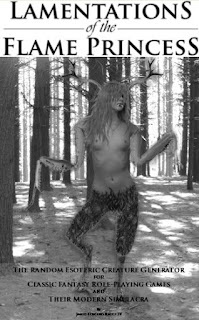 One of my favorite movies is Captain Kronos: Vampire Hunter. And when the female lead is introduced, she's been put in the stocks. Her crime? Dancing on a Sunday. And after getting the fancy boxed set version and rewatching it this year, that's become my favorite way to describe what everyone gets upset about.
One of my favorite movies is Captain Kronos: Vampire Hunter. And when the female lead is introduced, she's been put in the stocks. Her crime? Dancing on a Sunday. And after getting the fancy boxed set version and rewatching it this year, that's become my favorite way to describe what everyone gets upset about.Oh, you used a bad unacceptable word!
Dancing on a Sunday.
That picture is unnecessarily graphic!
Dancing on a Sunday.
You've expressed irresponsible social views!
Dancing on a Sunday.
You made a joke about a sensitive topic!
Dancing on a Sunday.
You're displaying a political point of view I find unacceptable!
Dancing on a Sunday.
Remember the whole Janet Jackson Superbowl controversy? Literally dancing on a Sunday!
I don't even like ratings. Ratings change how people create, both in concept and altering a “finished” product after the fact to attain certain ratings, because ratings shape the potential audience. That's not serving an informational function, that's censorship. Fuck em all.
I know I'm on the far end radical about this sort of thing. Everyone's got that one thing they're fanatical about and this is my thing. People should just be able to do shit creatively without being able to worry that they're going to be actually restricted because of it.
A couple of my favorite stories about censorship:
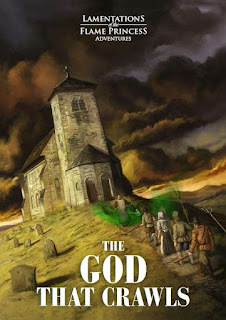 Back in the day, the movie Nekromantik (a movie about necrophilia) was banned in Finland, so a festival organizer arranged a ferry trip to Estonia so people could see the movie. How ridiculous is that? I learned about this story in 2015 when attending a festival in Helsinki to see the movie. Who benefitted from making Finnish people go to Estonia to watch a movie?
Back in the day, the movie Nekromantik (a movie about necrophilia) was banned in Finland, so a festival organizer arranged a ferry trip to Estonia so people could see the movie. How ridiculous is that? I learned about this story in 2015 when attending a festival in Helsinki to see the movie. Who benefitted from making Finnish people go to Estonia to watch a movie?For many years the first three Cannibal Corpse albums were banned in Germany, and no songs were from those albums were allowed to be performed live. There were police monitors at their shows. They'd play the songs anyway, just under different names. That ban was lifted in 2006, but just a couple years ago Germany banned the Cannibal Corpse coloring book. A coloring book!
I've got no sympathy for anyone who argues for restricting the availability of creative work. The fact that all of this is still an ongoing concern makes me more confrontational about it. The books, movies, and music that I like pretty much guarantees that some of this stuff was always going to be a part of LotFP, but the fact that there are people who want to penalize people for making up stuff they don't like makes me do it more.
And we do get penalized for it. The first Free RPG Day book we put out was trashed by a number of the participating stores. We were later kicked out of Free RPG Day entirely because some other publisher threatened to pull out if we were allowed to continue to participate. One of our titles got trashed by a British distributor, and we only caught wind of that because one of the distributor's employees publicly complained that the bosses didn't let her look at it first, they thought it was so bad. Our stuff regularly gets denied from DriveThru, sometimes for reasons I can't fathom.
And of course there's the reputational factor, “Oh, they do that sort of thing.” Well yes, but not only that sort of thing. You work outside of someone's comfort zone once and they're going to try to punish everything you do because of it.
I just don't understand the impulse to look at something and decide that the public shouldn't get to decide for themselves whether they accept it or not. And it's the worst when it comes from someone who makes things themselves; it's the basest form of cowardice, trying to argue for caps on imagination and be in favor of more restricted thinking in creative work.
Aarrrghhh I get so angry, even when it happens to something I don't care about, even when it happens to something/someone I don't like. I don't understand why anyone does that, and I don't understand why anyone goes along with it.
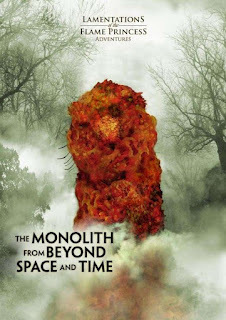 And yes, that includes pretty much whatever example anyone reading this is thinking of. Blatant plagiarism is about all I can get on board with restricting.
And yes, that includes pretty much whatever example anyone reading this is thinking of. Blatant plagiarism is about all I can get on board with restricting.To me, the first step in doing anything creative is to take down the creative walls so there's nothing but clear horizons on all sides, and then you decide what you want to create. If there's someone keeping creative walls up, how do people not feel like they're being physically crushed? How are they not expending at least some of their creative energy attacking those walls?
Hmm. I got very worked up answering this one. But it is the hill to die on.August 14, 2025
Interview: James Edward Raggi IV (Part I)
I think it's fair to say that James Edward Raggi IV needs no introduction. He's been publishing old school fantasy roleplaying game materials since 2008, many of which are not only foundational to the OSR but also take inspiration from the works and ideas of H.P. Lovecraft. I asked James a few question relating to LotFP, HPL, and other matters and he very kindly provided with some lengthy answers that will appear over the course of the next three days.
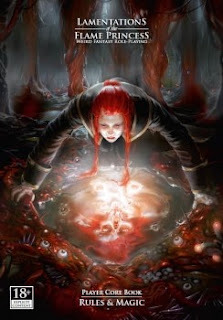 1. Let’s start with the obvious: Lamentations of the Flame Princess has always been described as a “weird fantasy roleplaying game.” What does “weird” mean to you and what role does Lovecraft play in shaping that definition?
1. Let’s start with the obvious: Lamentations of the Flame Princess has always been described as a “weird fantasy roleplaying game.” What does “weird” mean to you and what role does Lovecraft play in shaping that definition?Formally it's taken straight from Lovecraft's definition of “weird” from his Supernatural Horror in Literature essay:
“The true weird tale has something more than secret murder, bloody bones, or a sheeted form clanking chains according to rule. A certain atmosphere of breathless and unexplainable dread of outer, unknown forces must be present; and there must be a hint, expressed with a seriousness and portentousness becoming its subject, of that most terrible conception of the human brain—a malign and particular suspension or defeat of those fixed laws of Nature which are our only safeguard against the assaults of chaos and the daemons of unplumbed space.”
Basically what Lovecraft called “cosmicism.”
I think the best example of this sort of “weird” in fiction wasn't even made by Lovecraft, but by Algernon Blackwood in The Willows. I put some quotes of this in the old Grindhouse box for LotFP that I thought served as the best short examples:
“We had strayed into some region or some set of conditions where the risks were great, yet unintelligible to us; where the frontiers of some unknown world lay close about us. It was a spot held by the dwellers in some outer space, a sort of peep-hole whence they could spy upon the earth, themselves unseen, a point where the veil between had worn a little thin.”
“You think it is the spirit of the elements, and I thought perhaps it was the old gods. But I tell you now it is neither. These would be comprehensible entities, for they have relations with men, depending upon them for worship or sacrifice, whereas these beings who are now about us have absolutely nothing to do with mankind, and it is mere chance that their space happens just at this spot to touch our own.”
“There are forces close here that could kill a herd of elephants in a second as easily as you or I could squash a fly. Our only chance is to keep perfectly still. Our insignificance perhaps may save us.”
That's my ideal of what the “weird” should be, but in practical terms it isn't always so. It's sometimes just a slush word to signify some sort of genre crossing, such as mixing fantasy with horror or sci-fi.
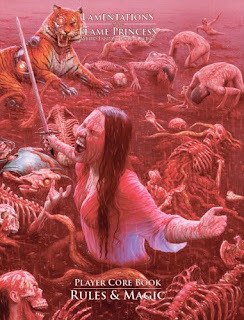 2. Lovecraft's tales often revolve around the epistemological dread of human beings confronting truths they were never meant to know. Do you see LotFP as engaging with a similar kind of cosmic pessimism? Or is the horror in LotFP more grounded, more human?
2. Lovecraft's tales often revolve around the epistemological dread of human beings confronting truths they were never meant to know. Do you see LotFP as engaging with a similar kind of cosmic pessimism? Or is the horror in LotFP more grounded, more human?I don't know that it's cosmic pessimism so much as realism. We already have an approximate date on the destruction of our solar system. A random solar flare could fry all our modern technology at any time. Some space rock can do to us what an earlier rock did to the dinosaurs. Not to mention any of the possible manmade apocalypses, or how the trajectory of man changes forever with technological tools such as agriculture, literacy, automobiles, television, or social media.
One thing about man, though, is whatever doesn't kill him, he adapts to and gets used to.
And that “things that man was never meant to know” themes is only from a certain point of view. Notice that everybody, everybody, that Lovecraft labels as degenerate: backwoods New Englanders, non-white people, whatever, they all seem to have a better handle on how Lovecraft's literary universe works just fine. They adapt and work with; a lot of the stories seem to feature human agents of whatever the current story's horror is. It's Lovecraft's protagonists, often bookish people like him, who have a hard time accepting these revelations. Lovecraft's horror comes from attacking his own worldview.
But people like Dr. Muñoz, Ephraim Waite, Richard Pickman, Keziah Mason are all to my recollection people who Lovecraft would otherwise approve of genealogically, and they're working with the horrific elements of Lovecraft's world. Herbert West and Erich Zann could be on that list if they were a bit more competent, but they weren't so they got overwhelmed by what they were playing at.
Lovecraft's view of this I think is wrapped up in a bow in The Call of Cthulhu:
“The time would be easy to know, for then mankind would have become as the Great Old Ones; free and wild and beyond good and evil, with laws and morals thrown aside and all men shouting and killing and revelling in joy. Then the liberated Old Ones would teach them new ways to shout and kill and revel and enjoy themselves, and all the earth would flame with a holocaust of ecstasy and freedom.”
I mean what's next after that, equal rights and girls wearing short skirts in public?
I'm being a bit facetious here, but for all we're told that there are great powers at work that can snuff out humanity if it ever bothered to notice them, the Dunwich Horror is banished, Cthulhu is sent back to sleep, and Thing on the Doorstep indicates that humans are either cooperating with or have imprisoned a shoggoth (the story isn't so clear on that point, but the point is they're not some species-ending threat). The US government wiped out Innmouth's Deep One colony. No matter how often his stories might assert it in the author's voice, I don't think they actually demonstrate cosmicism through what happens. No, the universe isn't humanocentric, but humanity has its place in the universe and can defend it.
In the real world, humans can split the atom and create viruses that can sweep the planet and we're on the cusp of real machine intelligence and we've already taken our first baby steps on the journey to traveling to the stars.
As far as how LotFP approaches all this, yeah, we've got some adventures that are simply some alien/outside threat causing problems that must be somehow solved. But the best LotFP stuff involves humans messing with these powers for their own benefit, and the adventure premises are simply the fallout of this human curiosity/greed.
And if the NPCs can mess around with and harness this power... well why shouldn't the PCs be able to as well? Don't traditional RPGs teach us that characters are entitled to more power as the game goes on?
Humans are just another mythos creature. We're just used to how we are so we don't notice it.
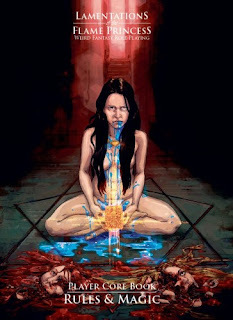 3. How consciously have you drawn on Lovecraft’s themes, structures, or even prose style when writing LotFP material, especially in your adventures, like Death Frost Doom or The God that Crawls?
3. How consciously have you drawn on Lovecraft’s themes, structures, or even prose style when writing LotFP material, especially in your adventures, like Death Frost Doom or The God that Crawls?LotFP wouldn't look anything like it does without Lovecraft's direct influence. Our first publication in 2009, Death Frost Doom, had second-hand Lovecraft influence. It had a heavy Evil Dead inspiration, and the catalyst for the events in Evil Dead is the Necromonicon Ex-Mortis.
Tower of the Stargazer and Weird New World in 2010 had some Lovecraftian bits, but they weren't front and center at all.
We didn't hit Lovecraft directly until Carcosa in 2011 and that used the actual Lovecraftian entities. But 2012's The Monolith from beyond Space and Time was explicitly about being Lovecraftian, but without using all the Lovecraftian stuff ... sort of like how LotFP is like D&D without all the D&D stuff. For example our stand-in for the Necronomicon in Monolith was the head of Carter Holmes, and you get at the forbidden knowledge by eating his brains, which he begs you to do. The God that Crawls, released at the same time, has some Lovecraft-inspired bits, and then we were off to the races. So many things had explicitly Lovecraftian-inspired ideas from there.
Every so often we do use an actual Lovecraft beastie (most notably in Fish Fuckers – I am using that example just so people reading your blog have to see the words Fish Fuckers – where we did the usual “humans victimizing the Deep Ones” subversion), but the influence is mostly in general concepts more than yoinking specific things. I mean, we do the generic thing of “impossible extradimensional entities,” which is firmly Lovecraftian in that they're just entities and not “gods” in any religious sense of creating the universe or controlling any aspect of it. The universe in LotFP games is not assumed to have any objective morality or moral order. (Our use of the Law-Neutrality-Chaos alignment scheme is based on what magic, if any, someone wields and has nothing to do with being a good or bad person or what you do with that magic.)
I don't think I've used the work “squamous” anywhere yet. That's one box I should tick off in my next book.
But “Lovecraftian” is a squishy term, come to think of it. Basically any alien predator can be said to be “Lovecraftian” because it's demonstrating that the universe isn't all about us.
I guess the most pure Lovecraftian theme would be “pursuing forbidden knowledge gets you in trouble” but that would make Faust Lovecraftian (or Frankenstein, if we want to take The Devil and the moral implications thereof off the table) and the whole exercise of nailing “Lovecraftian” down exactly seems to be silly.
“The universe isn't about us” is just how reality actually is, and if “the discovery of knowledge that shatters your worldview and changes your mind irrevocably” qualifies as Lovecraftian, then just being a child who grows up would be Lovecraftian.
It's tricky just even nailing down “Lovecraftian” as a series of tropes. It's not the specific language. You can see it in all the pastiches that are just “Lovecraftian” remix Mad Libs and they fail, fail, fail, fail.
It's not just the ideas, it's not just the vocabulary; it's the attitude of the man himself that is the glue. He wasn't quite the reclusive weirdo that has somehow become the popular conception of him, but he didn't fit into his contemporary society at all. If you read Joshi's I Am Providence biography of the man (the unabridged version) and/or Houellebecq's Against the World, Against Life, you get the picture of a man that is in some ways a perfectly affable man socially but in other ways deeply disturbed and unable to participate in normal life. The authors that successfully work in the Lovecraftian mode seem to all have something very “off” with them as well ... Thomas Ligotti comes to mind and his Conspiracy Against the Human Race (which is a non-fiction book, for anyone who didn't know) makes it obvious how he's able to go into that mode and make it work. R.E. Howard was obviously not a well man. Edgar Allan Poe was one of Lovecraft's chief inspirations and he was all fucked up. I don't know as much about Clark Ashton Smith's life but everything I read about him indicates mental health issues and a lengthy health decline in his 20s.
I don't know exactly how my state of mind matches up with these people, but I have the stretches of being medicated and an entire lifetime of being at arm's length from what were supposed to be my peers to show that I'm not quite right. Hopefully more towards the CAS end of things than REH.
I'm probably way off topic here, but to wrap this question up I'd like to point out a good way to tell who is going to be complete shit at working in the Lovecraftian mode. People who judge Lovecraft as a person. People will publish entire books built entirely on Lovecraft's work and then in that same book point out what a piece of shit Lovecraft was as a human being.
Forget how tasteless that is, how ungrateful that is. If you're going to try to show off how much of an upstanding citizen you are and make moves to be a valued member of the community in this way ... I don't think you even have the capacity to understand what made Lovecraft tick and why his writing works. His work is built entirely on his neuroses, both those we'd consider benign, and those we'd consider malignant. You don't have to like it, you don't have to incorporate all or any of his neuroses into your work (use your own!), but if you can't tolerate or accept it, if you're distancing yourself from any of that, how in the bloody fuck can you possibly work in his milieu without it being the most surface-level clown show?
If you were actually better than Lovecraft in any way, morally or creatively, you wouldn't feel the need to be sucking at his teat almost 100 years later in order to pay for your supper.August 13, 2025
Awe-ful
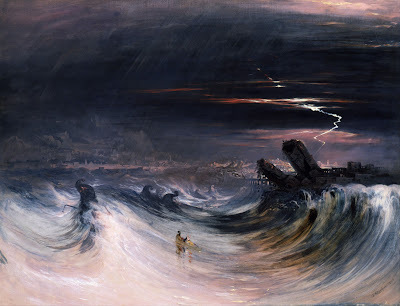 There is a particular kind of emotion that, in my experience, is easily forgotten in our world of algorithms and explanations but that once held a central place in human experience. I’m speaking of awe, not merely in its diluted modern sense, but in its original meaning: a mixture of wonder and fear in the face of something vast, strange, and beyond human comprehension. It’s a feeling that borders on the religious and it is the lifeblood of the weird and the uncanny.
There is a particular kind of emotion that, in my experience, is easily forgotten in our world of algorithms and explanations but that once held a central place in human experience. I’m speaking of awe, not merely in its diluted modern sense, but in its original meaning: a mixture of wonder and fear in the face of something vast, strange, and beyond human comprehension. It’s a feeling that borders on the religious and it is the lifeblood of the weird and the uncanny.H.P. Lovecraft understood this, perhaps better than most writers of the last hundred years. Through his work, he attempted to refine the weird tale it into a kind of secular mysticism, in which the cosmos itself becomes the site of both revelation and terror. In Supernatural Horror in Literature, he famously wrote that
“The oldest and strongest emotion of mankind is fear, and the oldest and strongest kind of fear is fear of the unknown.”
However, Lovecraft’s best stories do more than simply terrify. They evoke awe in its fullest sense, what he elsewhere calls a “certain atmosphere of breathless and unexplainable dread of outer, unknown forces.” When he describes beings whose very geometry defies human perception or ancient truths that shatter the minds of those who grasp them, he is evoking something far deeper than mere fright. He is pointing toward the sublime.
Sigmund Freud distinguished between the "uncanny" and the "familiar," noting how the former is not simply the unknown, but the strangely known, the familiar made alien. Lovecraft seized on this psychological dissonance and expanded it to include the entire cosmos. His monsters are not just unknowable; they are that which we once knew in some long-buried dream of pre-human memory. The sense of uncanny recognition is part of the horror. It is this effect, more than mere violence or gore, that marks the best weird fiction.
Of course, horror is only part of the equation. What often goes unspoken is how beautiful the weird can be. The shimmering city of the Elder Things beneath the ice of Antarctica; the dream-haunted vistas of Kadath; the mind-transcending journey of Randolph Carter through the stars. These are not scenes of mere terror. They are awe-inspiring in the truest sense – sublime and strange, but also profoundly glorious. Lovecraft understood that what we call horror and what we call wonder are not always distinct categories. The numinous is a threshold. The emotion it provokes may be colored by fear, reverence, or ecstasy or some combination of the three.
Naturally, this brings me to roleplaying games.
When I think back to my earliest experiences with RPGs, what strikes me most is how often they trafficked in awe. I'm not talking about desperate combats or puzzles to be solved, but fleeting and fragile moments when the game evoked something stranger and deeper. A mysterious door that could not be opened. A statue with eyes that seemed to follow you. A creature whose motives and nature eluded simple categorization. In those moments, even the purple prose of boxed text or the improvisations of a teenaged Dungeon Master could occasionally brush up against the ineffable.
This is, I think, one of the great potentials of the roleplaying medium: its ability to resurrect feelings that modern life has largely anesthetized, like wonder before the uncanny. These feelings are not mere tropes to be mined, but modes of perception, ways of seeing the world as something deeper and more alive with meaning and strangeness.
Lovecraft feared the loss of these feelings in modernity. It's ironic that he is most famous for his fiction, because Supernatural Horror in Literature, an essay of literary criticism, is undeniably one of his greatest works. There, he laments the triumph of the merely rational in fiction and calls for a return to cosmic awe, a feeling that transcends individual psychology and touches something vast and impersonal. He believed that the weird tale could restore "the stimulation of wonder and fancy." It's no surprise, then, that his own work (and the many games it inspired) have done exactly that for generations of readers and players.
Perhaps that is the true function of the weird tale (or the weird game): to break through the crust of the mundane and let in something ancient, fearful, and magnificent. Weird tales remind us that the universe is, to paraphrase J.B.S. Haldane, not only stranger than we imagine, but stranger than we can imagine and that, in the face of that strangeness, we are still capable of awe.Second Thoughts
August 12, 2025
Retrospective: Call of Cthulhu
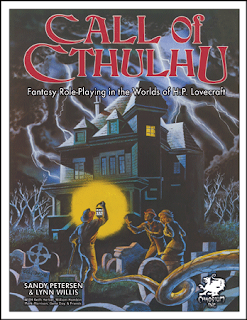 "Didn't James already do a Retrospective on Call of Cthulhu?" After four hundred posts in this series – this one is, in fact, the four hundredth – you would understandably think that, but it's not true. As I've discovered in the process of choosing the contents of my Grognardia anthologies, I didn't start writing Retrospective posts until September 17, 2008 and, even then, those posts didn't become consistent, weekly features of the blog for a while longer.
"Didn't James already do a Retrospective on Call of Cthulhu?" After four hundred posts in this series – this one is, in fact, the four hundredth – you would understandably think that, but it's not true. As I've discovered in the process of choosing the contents of my Grognardia anthologies, I didn't start writing Retrospective posts until September 17, 2008 and, even then, those posts didn't become consistent, weekly features of the blog for a while longer. Now, I did write a post – my first one on the subject – about Call of Cthulhu on October 31, 2008 that definitely has something of a Retrospective vibe about it. Indeed, I regularly link to that post as a kind of substitute for the fact that, even after all these years, I'd still never written a Retrospective on CoC, despite my immense affection for the game, which I consider among the greatest and most influential games and game designs in the history of the hobby.
Since I'm now nearly halfway through my The Shadow over August series honoring the memory of H.P. Lovecraft, I thought now might be the perfect time to rectify this very old oversight on my part. However, since my original post from 2008, "A Game for Grown-Ups," already covers much of the ground I'd usually cover in a Retrospective post, I've decided that this one will instead focus on a different aspect of Call of Cthulhu, namely, its place in the history of the hobby.
When the game first appeared in 1981, it was unlike anything that had come before it. Published by Chaosium and designed by Sandy Petersen and Lynn Willis, it was the first fully realized horror role-playing game. There had, of course, been fantasy games with horrific elements before it. Dungeons & Dragons, for instance, had more than its share of shambling undead and sanity-blasting monsters, but Call of Cthulhu was the first to make horror not merely an atmospheric seasoning but the whole meal. In doing so, it did more than simply introduce a new genre to the RPG marketplace; it reframed what a role-playing game could be.
The significance of being first is hard to overstate. By 1981, science fiction, post-apocalypse, superheroes, and espionage each had their own dedicated RPGs, often more than one. Horror, however, remained conspicuously absent, perhaps because many assumed its central emotion, fear, couldn’t be easily conjured at the table. Petersen’s ingenious solution was not to frighten the players directly, but to have them role-play fear. Dread emerged from the slow unravelling of an investigator’s mind, the accumulation of forbidden knowledge, and the grim realization that the forces at work could never be overcome in the usual, heroic way.
This approach has since become the template for almost all horror games, even when they are self-consciously attempting to distance themselves from it. Just Alfred North Whitehead famously called Western philosophy a series of footnotes to Plato, the same can be said of Call of Cthulhu's place in the realm of horror RPGs. The sanity mechanic, the emphasis on investigation over combat, and the focus on player knowledge versus character fragility all flowed from Petersen’s design choices in Call of Cthulhu. Nearly every horror RPG since has grappled with or responded to this foundation.
For Chaosium, Call of Cthulhu was similarly transformative. Before 1981, the company was best known for RuneQuest and its Glorantha setting, along with Basic Role-Playing, the streamlined system that powered it. These were critical successes but niche compared to the behemoth that was TSR. Call of Cthulhu changed the equation, thanks to its much wider appeal. By the mid-1980s, Call of Cthulhu was outselling everything else Chaosium produced and it became the company’s flagship line for decades. In many respects, Call of Cthulhu was Chaosium in the public mind and arguably is still the game most closely associated with the company.
It’s telling that Chaosium survived rough patches in its history largely because Call of Cthulhu never went out of print. Where other RPGs waxed and waned in popularity, CoC had a steady, international audience. Indeed, its scenarios and campaigns became not just supplements but cultural touchstones in RPG history. Many are considered landmarks whose influence extends far beyond their original audience, much like Call of Cthulhu itself. Looking back, the game’s influence is visible everywhere. Here are just a few that occur to me:
Dungeons & Dragons modules before 1981 were largely site-based adventures. By contrast, CoC’s scenarios pioneered investigation-driven play, where clues, interviews, and research were central. This structure seeped back into other genres, shaping how adventures were written.
Though frequently imitated, few mechanics have been as thematically perfect as CoC’s sanity rules, which track not just the erosion of mental stability but the cost of knowing too much. It’s become almost impossible to design a horror RPG without addressing the question: what’s your version of this mechanic?
Translations of CoC played a huge role in spreading RPGs worldwide, especially in countries where Lovecraft’s stories already had a foothold. In France, Japan, and elsewhere, it rather than, say, Dungeons & Dragons was often the gateway RPG.
More than four decades later, Call of Cthulhu is not merely Chaosium’s flagship; it is "the Dungeons & Dragons of horror gaming." It has become the lingua franca of the genre, the common framework through which players, Keepers, and designers alike approach tales of the uncanny and the unknown. It remains the benchmark for how to adapt a literary source faithfully without becoming a prisoner to it, preserving the essence of Lovecraft’s cosmic dread while evolving into a style of play all its own.
Like D&D, it has been endlessly imitated, parodied, expanded upon, and reimagined, yet the original endures – still recognizably itself and still drawing new players into its orbit. For many, it is not simply a horror RPG; it is the horror RPG, the game against which all others are measured. As long as players gather to face ancient secrets and watch their fragile investigators descend into madness, Call of Cthulhu will remain the universal tongue of tabletop terror."Lovecraft was not a good writer."
It’s a commonplace criticism of H.P. Lovecraft that his writing is overwrought and I can certainly understand why one might say so. His style is undeniably dense with adjectives, studded with archaisms, and includes unusual words like "eldritch" and "cyclopean" to cite just two obvious examples. These are old indictments. In a 1945 essay appearing in The New Yorker, the American literary critic, Edmund Wilson stated plainly
"Lovecraft was not a good writer. The fact that his verbose and undistinguished style has been compared to Poe's is only one of many sad signs that almost nobody any more pays real attention to writing."
Many modern readers, including some who otherwise enjoy horror fiction, more or less agree with Wilson's judgment. On some level, there's more than a little truth to it, but I also think Wilson missed something essential about what Lovecraft was trying to do.
Certainly, Lovecraft’s prose is not plain. He does not describe a crumbling house or the whisper of wind through dead trees with, say, Hemingway’s economy. Instead, he piles on adjectives like charms against something too large and too old to be named. This is not accidental. Lovecraft was not a bad stylist. He was a purposeful one, even if he was not always a successful one. Any faults of his prose are, I believe, the byproduct of its ambition.
One of Lovecraft’s core preoccupations was with the limits of human understanding. His protagonists, whether scholars, scientists, or dreamers are nearly always brought to a precipice – of history, of knowledge, of space or time – beyond which lies something that cannot be fully grasped by the human mind. The horror in Lovecraft's stories is not simply monstrous; it is ontological. His stories revolve around experiences that are, by definition, indescribable. Despite this, they must be described, for the very simple reason that fiction requires language.
Faced with this paradox, Lovecraft responded in a way that makes perfect sense: he embraced inadequacy. His style is not polished to clarity but instead embraces excess. His adjectives are cumulative, not precise. His use of antiquated words is not an attempt at faux-scholarly authority, but a deliberate effort to suggest a register of experience outside the ordinary. The result is not always readable in the conventional sense, but it is evocative and that is the point.
In this way, Lovecraft’s prose functions almost like glossolalia or automatic writing. It does not persuade or explain. It reaches instead for effect. Its baroque qualities are not the product of ignorance or even bad taste, but of desperation. They're an attempt to use every available tool to conjure a feeling of cosmic awe or creeping dread. The occasional absurdity of his style, like the much-mocked “indescribable” things described at length, should not obscure the sincerity and power of his attempt.
One might say that Lovecraft was not writing about the weird so much as trying to write weirdly, if you can see the distinction. His stories are often most effective when read not for their literal content but for their cumulative mood, the way one might listen to a dissonant piece of music not to understand something, but to feel something. That he sometimes failed in this attempt is obvious. That he failed interestingly – and at times succeeded brilliantly – is equally so.
This does not mean that all criticisms of his prose are misplaced. Even Lovecraft himself was aware of his stylistic excesses and, in his letters, often laments them. However, to dismiss his writing as “bad” in some generic sense is to misunderstand both what he was trying to do and how radical it really was. His style was not an obstacle to his cosmicism. Rather, it was cosmicism writ large, trembling with adjectives and echoing with the voices of unnamable things.August 11, 2025
The Articles of Dragon: "The Cthulhu Mythos Revisited" and "A Rebuttal to 'The Cthulhu Mythos Revisited'"
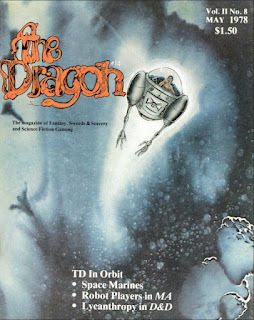 Having already broken the original intent of this series by highlighting Dragon magazine articles I never read during their initial publication simply because of their Lovecraftian content, I'm going to do so again, this time by discussing two articles in a single post. In this case, I think it can be more than justified for a couple of reasons. Firstly, the "articles" in question are actually letters to the editor and, therefore, comparatively short. Secondly, the two letters are in dialog with one another, as well as with the "From the Sorcerer's Scroll" column I discussed last week. Discussing both of them here thus makes a great deal of sense.
Having already broken the original intent of this series by highlighting Dragon magazine articles I never read during their initial publication simply because of their Lovecraftian content, I'm going to do so again, this time by discussing two articles in a single post. In this case, I think it can be more than justified for a couple of reasons. Firstly, the "articles" in question are actually letters to the editor and, therefore, comparatively short. Secondly, the two letters are in dialog with one another, as well as with the "From the Sorcerer's Scroll" column I discussed last week. Discussing both of them here thus makes a great deal of sense.The first letter by self-proclaimed "High Priest of the Great Old Ones," Gerald Guinn, appears in issue #14 (July 1978). It's mostly a nitpicky – and inaccurate – criticism of the Kuntz and Holmes presentation of the Mythos in D&D terms. I say "inaccurate," because Mr Guinn, despite being "an avid fan of Lovecraft," seems to have imbibed more than a little of the Derlethian Kool-Aid when it comes to his understanding of HPL's creation (and I say this as someone who unironically appreciates Derleth's contributions). His complaints, by and large, boil down to deviating from Derleth's interpretations of Lovecraft.
For example, Guinn repeats the un-Lovecraftian idea that the Elder Gods "defeated" the Great Old Ones, as well as making dubious genealogical ("Cthulhu, first spawn of Yog-Sothoth") and elemental connections ("Hastur ... is the KING OF AIR !!!!!!!") that have no basis in HPL's own texts. In some cases, I'm not even certain I can pin these errors on Derleth, who, for all his faults, never seemed to have suggested that Nyarlathotep was a Great Old One or an offspring of Azathoth. Neither did Derleth make Ubbo-Sathla "the center of the universe."
This is all very "inside baseball" stuff, but I find it very interesting. If nothing else, it's a reminder of just how obsessive nerds can be about getting the "facts" of fictional settings correct – and how much effort they'll put into demonstrating their superior knowledge of those facts. It's also a reminder of the extent to which not just Derleth but other post-Lovecraftian authors proved influential in fans' understanding of the Mythos. Much like Robert E. Howard's Conan, whose popular conception was largely colored by the pastiches of L. Sprague de Camp and Lin Carter, Lovecraft was similarly misunderstood well into the 1970s. Most of Guinn's objections stem, in my opinion, from such misunderstandings, including his taking issue with the D&D stats of Hastur, Cthugha, and so on.
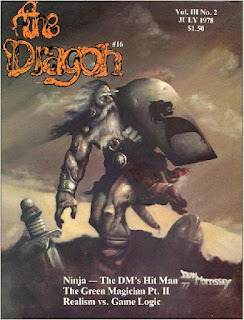 Rather than dwell on how many hit points a shoggoth should have, I want to turn to the second letter, which appeared in issue #16 (July 1978). Written by J. Eric Holmes, it's intended as an answer to Gerlad Guinn's critique of the original article. Holmes starts, amusing enough, by stating that "When one gets into religious controversy the first thing one discovers is that the scriptures themselves are self-contradictory and subject to varying interpretations." It's a funny line, but also an apt one, as dissecting just what Lovecraft meant or intended is a kind of exegesis. I've often felt that, as the practice of traditional religion has declined, many people have turned to pop culture as a replacement.
Rather than dwell on how many hit points a shoggoth should have, I want to turn to the second letter, which appeared in issue #16 (July 1978). Written by J. Eric Holmes, it's intended as an answer to Gerlad Guinn's critique of the original article. Holmes starts, amusing enough, by stating that "When one gets into religious controversy the first thing one discovers is that the scriptures themselves are self-contradictory and subject to varying interpretations." It's a funny line, but also an apt one, as dissecting just what Lovecraft meant or intended is a kind of exegesis. I've often felt that, as the practice of traditional religion has declined, many people have turned to pop culture as a replacement. Whether my thesis is true or not, Holmes quickly gets to the heart of the issue: the "From the Sorcerer's Scroll" column he and Rob Kuntz wrote "draws most heavily from Lovecraft's own works" rather than those of HPL's friends and imitators. This is a perfectly valid rebuttal and no more need be said on the matter. Even leaving aside the errors Guinn makes in his original critiques, which Holmes addresses individually, the larger point still stands, namely, that Kuntz and Holmes wrote their descriptions with Lovecraft in mind and no one else. To continue Holmes's earlier religious analogy, he prefers a textualist reading of the Mythos over any other.
One can, of course, agree or disagree with this approach, but I think it's a defensible one. In general, my own preferences when it comes to this specific question is fairly close to that of Holmes. At the same time, I think it's equally defensible to include a wider range of source material in conceiving of the Mythos. How wide a range is an equally important question. From its first edition, Call of Cthulhu, for example, has included a fairly broad range of sources – just look at the creatures in its bestiary – and that rarely raises any comment from gamers. On the other hand, I don't begrudge anyone who draws the line at one place or another, so long as he can articulate why and to what purpose.
These kinds of debates are fascinating to me. Lovecraft himself hoped his ideas and concepts, his monsters and alien gods would be picked up and used by other writers, each of whom would add his own wrinkles to the growing tapestry of what we now call the Mythos. He did not care that this would introduce contradictions and confusion, because that's the nature of a real mythology. The only thing I suspect he'd have objected to is the claim that there was one and only one "true" version that everyone else must accept. He wasn't founding a dogmatic religion but creating a smorgasbord of elements from which his fellow authors could pick and choose as they wished. In that respect, I think he'd probably be delighted at how broadly disseminated his ideas have since become, even if he might not like some of the specific uses to which they've been put.
Why Thousand Suns?
Why Thousand Suns? by James Maliszewski
An Attempt at a Sales Pitch
Read on SubstackOf Periwigs and Pallid Masks
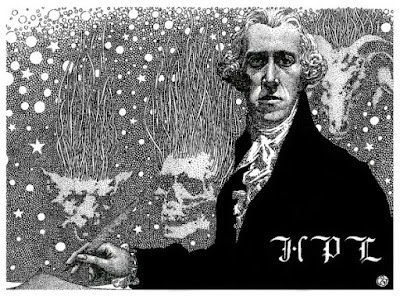 Virgil Finlay's depiction of Lovecraft as an 18th century gentlemanSince its initial publication in 1981, the default setting of Call of Cthulhu has been the 1920s, reflecting the decade in which many of H.P. Lovecraft’s stories take place. Over the years, however, Chaosium has greatly expanded the scope of the game through a variety of alternate historical settings. Beginning with
Cthulhu Now
in 1987, these supplements have offered Keepers and players the chance to explore the Mythos in different cultural and technological contexts, each one shedding new light on Lovecraftian horror by viewing it through a fresh historical lens. These settings reveal how the themes of cosmic dread and forbidden knowledge persist across the centuries.
Virgil Finlay's depiction of Lovecraft as an 18th century gentlemanSince its initial publication in 1981, the default setting of Call of Cthulhu has been the 1920s, reflecting the decade in which many of H.P. Lovecraft’s stories take place. Over the years, however, Chaosium has greatly expanded the scope of the game through a variety of alternate historical settings. Beginning with
Cthulhu Now
in 1987, these supplements have offered Keepers and players the chance to explore the Mythos in different cultural and technological contexts, each one shedding new light on Lovecraftian horror by viewing it through a fresh historical lens. These settings reveal how the themes of cosmic dread and forbidden knowledge persist across the centuries.Yet one historical period remains conspicuously absent: colonial America. To the best of my knowledge, Chaosium has never released a full supplement set in 17th- or 18th-century British North America. That strikes me as a peculiar omission, especially given Lovecraft’s own lifelong fascination with the 18th century. Lovecraft spoke often and fondly of the colonial era, which he regarded as the last bastion of esthetic and intellectual refinement before the coarsening of the modern world. His affection for 18th-century diction, architecture, and worldview was not mere antiquarianism. It was, in his mind, a form of temporal displacement. In a letter, Lovecraft wrote:
His disdain for the Revolution and American independence from Britain was equally unambiguous. In another letter, he declared:"I know always that I am an outsider; a stranger in this century and among those who are still men. ... Everything I loved had been dead for two centuries
“When my grandfather told me of the American Revolution, I shocked everyone by adopting a dissenting view ... Grover Cleveland was grandpa's ruler, but Her Majesty, Victoria, Queen of Great Britain & Ireland & Empress of India commanded my allegiance. 'God Save the Queen!' was a stock phrase of mine.”When others rose to honor The Star-Spangled Banner, Lovecraft would famously remain seated or, in some cases, sing “To Anacreon in Heaven,” the 18th-century drinking song whose melody Francis Scott Key had used as the basis for his poem, later adopted as the U.S. national anthem.
More than a personal affectation, Lovecraft’s British colonial sympathies run deep in his fiction. His only novel, The Case of Charles Dexter Ward, which I discussed in my earlier post today, is perhaps the clearest example of what I am talking about, but it's far from the only one. In Dreams in the Witch House , for example, the 18th-century witch Keziah Mason enters into a pact with Nyarlathotep and survives (at least in some form) into the modern age. The Shunned House delves into the lingering corruption left behind by late 17th century Huguenot émigrés to Rhode Island. Over and over, Lovecraft imagines New England not simply as a place with a long history, but as a place haunted by its own past of Puritan zealotry, pre-Christian beliefs, and unsettling imports from the Old World.
With that in mind, I began to toy with the idea back in the 1990s of writing a Call of Cthulhu supplement set in 18th-century British America. To be clear, I don't mean Revolutionary America. As I've already noted, Lovecraft had little patience for the mythology of 1776. What intrigued him (and me) was the world just before that rupture, when Boston remained loyal to the Crown, when the frontier still loomed dark and unknown, and when superstition and science existed in uneasy proximity. It’s a setting steeped in ambiguity, where the Enlightenment had only just begun to push back the shadows and had not yet succeeded.
Beyond Lovecraft’s own writings, there’s ample real-world history to inspire such a setting. The Salem witch trials, with their mix of religious hysteria and communal fear; the First Great Awakening, with its itinerant preachers stirring up visions of damnation; the beliefs of cunning folk in rural hamlets; and the syncretic spiritual traditions that arose from the cross-pollination of Europe, America, and Africa. All offer rich material for investigators to explore. The coast is dotted with smugglers' coves, abandoned forts, and plague ships quarantined offshore. Whispered rumors persist of forgotten Norse ruins in the north, ancient earthworks in the Ohio Valley, and strange lights dancing over the Blue Ridge Mountains.
In my own early drafts, I imagined that investigators might include skeptical physicians educated in Edinburgh, disgraced ministers fleeing scandal, or agents of the Crown sent to look into troubling reports from the hinterlands. They might chase whispers of beings haunting the Green Mountains or discover ruins whose builders are unknown to any tribe or settler. A frontier printer might find references in colonial pamphlets to the Sussex Manuscript or a Dutch merchant in Albany might acquire a fragment of a tablet whose script matches that of no known human tongue.
One of the things that initially drew me to this idea was the clarity of the colonial setting. It offers fewer technological conveniences, fewer societal safety nets, and fewer distractions, all of which I felt heighten the tension and sense of isolation. Even so, the setting is anything but simplistic. The early 18th century was a period when science, superstition, and theology all vied for dominance in the human mind. A figure like Emanuel Swedenborg, for example, could be taken seriously not only as a scientist and engineer but also as a visionary who conversed with spirits. That intellectual ambiguity suits the Mythos perfectly. What better era than this to imagine the slow, dreadful replacement of the Puritan conception of God with something darker and utterly indifferent to mankind?
As I said, I never got very far in developing the supplement, mostly because I became absorbed in another, related idea for Call of Cthulhu (more on that in a future post). However, I still think about it from time to time. Given Chaosium’s longstanding embrace of historical settings, I remain surprised that colonial America has yet to claim its rightful place among them. If nothing else, such a setting would offer a subtle tribute to Lovecraft’s own longing for an age of powdered wigs, flintlocks, and candlelight.
Were I not already neck-deep in other projects, I might be tempted to take the idea up again. Perhaps one day I will, assuming, of course, that some other industrious soul doesn’t beat me to it ...
August 10, 2025
Pulp Fantasy Library: The Case of Charles Dexter Ward
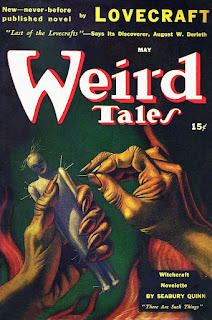
Of all the stories H.P. Lovecraft ever wrote, only one can rightly be called a novel, The Case of Charles Dexter Ward. Completed in 1927 in a burst of activity following his return to Providence after having lived in New York, the manuscript remained unpublished until 1941 (four years after Lovecraft’s death) when it appeared in Weird Tales in an abridged form over two issues. (The full version would appear two years later in 1943.) Lovecraft never revised it and in letters he dismissed it as “a cumbrous, creaking bit of self-conscious antiquarianism”
Yet, as is often the case with Lovecraft’s self-criticisms, his judgment was harsher than that of his readers. The very traits he found embarrassing, such as the novel's patient accumulation of historical detail, its period flavor, and its deeply rooted New England setting, are precisely what give it lasting appeal. A rare hybrid of Gothic horror and weird fiction, The Case of Charles Dexter Ward seems to me to owe as much to Poe and the 19th-century ghost story as to the cosmicism of Lovecraft’s later Mythos yarns. Indeed, no less a critic than S.T. Joshi considers The Case of Charles Dexter Ward "among the most carefully wrought fictions in Lovecraft's entire corpus."
The story opens with the puzzling disappearance of the titular character, who is a studious young man from Providence, Rhode Island. Ward is in an asylum to which he'd been committed after a disturbing change in his personality. Once merely eccentric in his love for history, he has recently become withdrawn, secretive, and obsessed with the occult, especially the life of his great-great-great grandfather, Joseph Curwen, a wealthy 18th-century merchant rumored to have been a necromancer. Curwen’s shadowy history of graverobbing, alchemical experiments, and whispered dealings with otherworldly beings ended, at least in official accounts, when Providence citizens raided his estate in 1771. However, no body was ever conclusively identified.
As Ward’s historical research deepens, he discovers Curwen’s letters, records, and formulas. He then begins retracing his ancestor’s steps. His studies turn to experimentation and strange lights, voices, and even disappearances unsettle Providence. Ward’s physical appearance subtly shifts, while his speech adopts 18th-century patterns and his manner grows cold and predatory. Those close to him, most notably his family doctor, Marinus Bicknell Willett, suspect that Ward is no longer entirely himself.
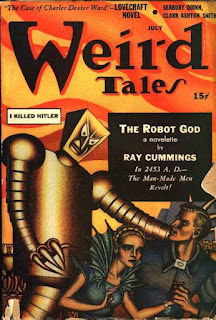 Their fears prove justified. In a hidden laboratory and a network of tunnels beneath the city, Ward revives the dead to extract ancient knowledge, making use of the “essential saltes [sic]” of long-buried figures. The truth then emerges that, through these same rites, Curwen himself has returned and assumed the identity of his descendant, whom he murders. Thus, it is not Ward but a reborn Joseph Curwen who is responsible for recent events.
Their fears prove justified. In a hidden laboratory and a network of tunnels beneath the city, Ward revives the dead to extract ancient knowledge, making use of the “essential saltes [sic]” of long-buried figures. The truth then emerges that, through these same rites, Curwen himself has returned and assumed the identity of his descendant, whom he murders. Thus, it is not Ward but a reborn Joseph Curwen who is responsible for recent events.In the end, Willett confronts the necromancer masquerading as Ward in the asylum. Using an incantation from Curwen’s own notes, Willett defeats him, reducing him to a "thin coating of fine bluish-grey dust." This is the Call of Cthulhu RPG's spell, resurrection, employed in reverse. Willett then shields the family from the full truth, calling it a case of madness, but the evidence of Curwen’s return and the scale of his occult dealings, suggest something far older and more terrible than mere insanity.
Lovecraft frames The Case of Charles Dexter Ward as a tale of the gradual unearthing of secrets, rich with colonial history and a sense that the past is never truly gone. It is not only a story of necromancy, but also a meditation on ancestral legacy. Consequently, the narrative builds slowly through. old letters, newspaper clippings, genealogical charts, and the reasoned observations of Willett, a man of science forced to confront the unscientific. As the pieces fall into place, the reader shares Willett’s growing conviction that the past is not inert but a living, active, and indeed malevolent presence.
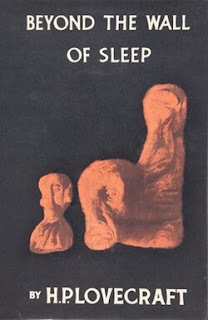 I find it tempting to wonder if the novel isn’t, in some oblique way, Lovecraft turning his gaze inward. Ward is, after all, an antiquarian from Providence, enamored of the past to the point of losing himself in it, a description that could fit Lovecraft himself. Ward’s fate, consumed and supplanted by his own ancestor, reads almost like a dark warning about what happens when one’s obsession with bygone ages ceases to be an intellectual pursuit and becomes an act of resurrection. Perhaps Lovecraft, consciously or not, was toying with the idea that his own retreat into colonial history and musty archives carried, if not such lurid dangers, at least the risk of being overwhelmed by the very past he adored.Lovecraft himself dismissed the book as a stylistic failure, but this may have been more a reflection of his perfectionism than of the work’s real value. In retrospect, The Case of Charles Dexter Ward stands as one of his best efforts, blending historical mystery, Gothic atmosphere, and supernatural horror into a single, sustained vision. In my opinion, the novel’s enduring appeal lies in its rich evocation of Providence’s past and its slow, inexorable unmasking of ancestral evil. Here, Lovecraft married his antiquarian obsessions to a fully realized narrative arc, creating a tale that is at once intimate in its focus and cosmic in its implications, a rare fusion that continues to reward rereading nearly a century after it was written.
I find it tempting to wonder if the novel isn’t, in some oblique way, Lovecraft turning his gaze inward. Ward is, after all, an antiquarian from Providence, enamored of the past to the point of losing himself in it, a description that could fit Lovecraft himself. Ward’s fate, consumed and supplanted by his own ancestor, reads almost like a dark warning about what happens when one’s obsession with bygone ages ceases to be an intellectual pursuit and becomes an act of resurrection. Perhaps Lovecraft, consciously or not, was toying with the idea that his own retreat into colonial history and musty archives carried, if not such lurid dangers, at least the risk of being overwhelmed by the very past he adored.Lovecraft himself dismissed the book as a stylistic failure, but this may have been more a reflection of his perfectionism than of the work’s real value. In retrospect, The Case of Charles Dexter Ward stands as one of his best efforts, blending historical mystery, Gothic atmosphere, and supernatural horror into a single, sustained vision. In my opinion, the novel’s enduring appeal lies in its rich evocation of Providence’s past and its slow, inexorable unmasking of ancestral evil. Here, Lovecraft married his antiquarian obsessions to a fully realized narrative arc, creating a tale that is at once intimate in its focus and cosmic in its implications, a rare fusion that continues to reward rereading nearly a century after it was written.
James Maliszewski's Blog
- James Maliszewski's profile
- 3 followers



